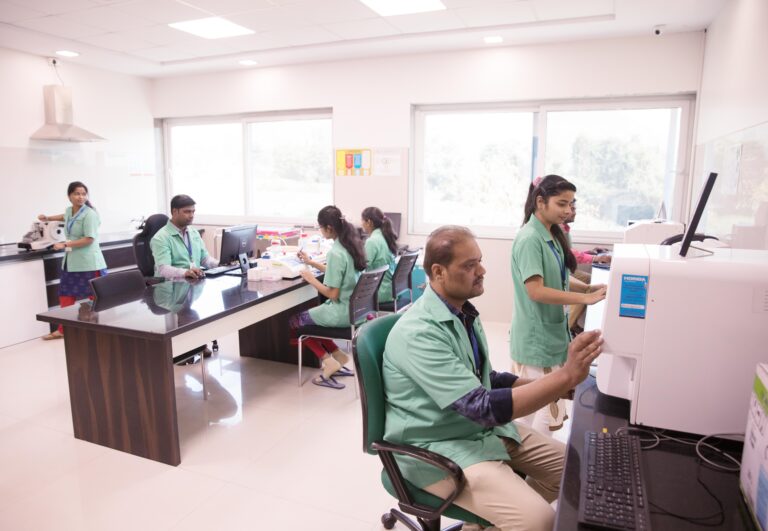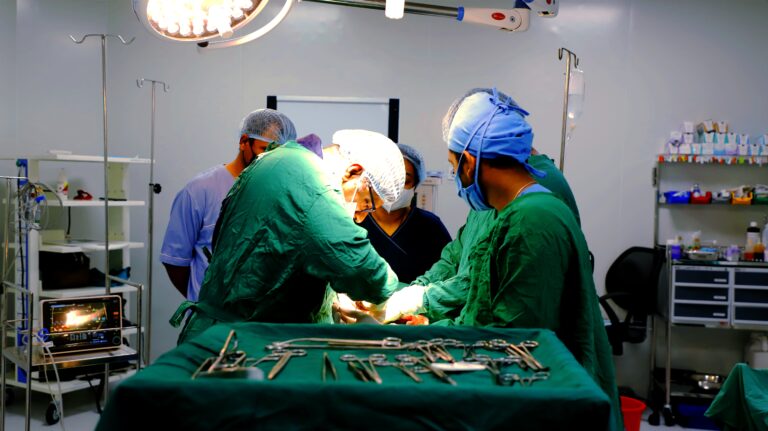Patient Information
- Home
- Patient Information






Patient Safety & Comfort is Our Topmost Priority
At Onco-Life Cancer Centre, your health, safety, and comfort are at the heart of everything we do. We are committed to:
- Delivering high-quality, safe medical care in a clean and secure environment.
- Following the highest standards of infection prevention and control across all departments, including OPD, inpatient areas, ICU, operating rooms, and diagnostic labs.
- Practicing transparent and compassionate communication with patients and their families to ensure they are informed and confident throughout the treatment journey.
- Providing emotional and psychological support through our in-house certified counsellors, social workers, and supportive care staff. We guide patients and their caregivers every step of the way.
Visitor Guidelines & Accommodation Facilities
We understand that the presence of loved ones brings emotional strength to patients. However, to ensure patient safety, hygiene, and a peaceful healing environment, we have certain visitor protocols and policies in place:
General Visiting Hours
4:00 PM – 7:00 PM (Monday to Saturday)
10:00 AM – 1:00 PM (Sundays & Public Holidays)
ICU Visiting Hours
4:00 PM – 7:00 PM (All Days)
- Only one visitor at a time is allowed per patient.
- Entry is strictly permitted after wearing sterile gowns and hand sanitization.
Important Visitor Guidelines
- Children below 12 years of age are not permitted in the patient wards or ICU to reduce infection risks and avoid disruptions.
- Visitors must wear visitor ID badges and follow the instructions of the ward staff.
- Please maintain silence, avoid phone calls in patient areas, and refrain from bringing flowers or outside food.
- Hand hygiene is mandatory before and after visiting the patient.
- Visitors with flu, fever, or infections should avoid visiting for patient safety.
Visitor & Family Accommodation
We provide comfortable and affordable accommodation options for outstation relatives and attendants, especially when the patient is admitted in the ICU or requires long-term hospitalization.
- Dormitory Facility available on request for ICU patient relatives.
- Nearby guesthouse referrals and budget lodges are arranged in coordination with hospital administration.
- Please contact the Reception Desk or TPA/Helpdesk for bookings, charges, and availability.
Additional Guidelines
- All visitors must register at the front desk with valid ID before entering any inpatient area.
- No visitors are allowed after visiting hours, except in emergency situations, which will require approval from the treating consultant.
- Treat all hospital staff with respect. Any inappropriate behaviour or breach of rules may lead to restricted visitation.
- Do not litter, smoke, or use mobile phones in restricted zones.
Timing
Dr. Amol Pawar : (Monday To Saturday) - 9:30am to 6:00pm
Dr. Chaitra Deshpande : (Monday To Saturday) - 9:30am to 6:00pm
Dr. Manoj Lokhande : (Monday To Wednesday) - 9:30am to 6:00pm
Dr. Tejal Gorasia : (Tuesday To Saturday) - 9:30am to 6:00pm
Dr. Sunil Patil : (Thursday & Saturday) - 9:30am to 6:00pm
Dr. Ravikumar Wategaonkar : (Friday) - 9:30am to 6:00pm
Dr. Dattatraya Andure : (Tuesday & Wednesday) - 9:30am to 6:00pm
Dr. Vinod Patil : (Monday to Saturday) - 9:30am to 12:00pm
Dr. Prasad Kaware : (Monday to Saturday) - 9:30am to 6:00pm
Dr. Swapnil Deshmukh : (Monday to Saturday) - 9:30am to 6:00pm
Dr. Vikas Patil : (On Call Basis) - 9:30am to 6:00pm
Dr. Asha Barge : (Monday) - 9:30am to 6:00pm
Dr. Harshad Patil : (Monday To Saturday) - 5:00pm to 8:00pm
Dt. Vijaya Rishikesh Kadam : (Monday To Friday) - 1:00pm to 5:00pm
Dr. Prasad Salunkhe : (Tuesday & Thursday) - 5:00pm to 8:00pm
Dr. Vandana Patil : (Monday To Saturday) - 11:00am to 12:00pm
Dr. Ahalya Nair : (Monday To Saturday) - 9:30am to 6:00pm
Dr. Siddhesh Tryambake : (Friday) - 10:00am to 6:00pm
Dr. (Lt Col) Abhishek Purkayastha : (Monday, Tuesday, Thursday & Friday) - 9:30am to 6:00pm
Dr. Gaurav Jaswal : (Tuesday) - 9:30am to 6:00pm
Dr. Adwaita Gore : (Third sunday of every month)-11 am to 5 pm.
Dr. Wasim Phoplunkar : (On Call Basis) 9:30 am to 6 pm
Dr. Tejal Gorasia : (Monday) - 9:30am to 6:00pm
Dr. Ehsanul Shaikh : (Tuesday)- 12 pm to 6 pm.
(Wednesday)- 11 am to 6 pm
Dr. Vikram Ghanekar : (Thursday) - 11:am to 3:pm
Dr. Ketan Kalariya : (Monday To Saturday) - 9:30am to 6:00pm
Dr. Amit Mirjolkar : (Tuesday) - 10:00am to 6:00pm
Dr. Suresh Advani : (On Call Basis) - 9:30am to 6:00pm
Dr. Gaurav Jaswal : (Monday, Wednesday, Thursday, Friday & Saturday) - 9:30am to 6:00pm
Dr. Abhishek Purkayastha : (Monday, Wednesday, Thursday, Friday & Saturday) - 9:30am to 6:00pm
Dr. Jyoti Mehta : (Full time) - 10:am to 6:00pm
Dr. Jaypal Reddy : (Friday) - 9:30am to 6:00pm
Dr. Mrunal Parab : (Monday To Thursday) - 9:30am to 6:00pm
Dr. Ravikumar Wategaonkar : (Monday & alternate Friday ) - 11:00am to 5:00pm
Dr. Jayant Gawande : (Friday) - 9:30am to 6:00pm
Dr. Sarang Waghmare : (Wednesday & Thursday) - 9:30am to 6:00pm
Dr. Vishvas Koul : (Monday To Saturday) - 9:30am to 6:00pm
Dr. Priya Agrawal : (Monday To Saturday) - 2:00pm to 4:00pm
Dr. Siddhesh Rajendra Tryambake : (Tuesday, Wednesday & Saturday) - 11:00am to 4:00pm
Dr. Utkarsh Ajgaonkar : (Monday to Saturday) - 9:30am to 6:00pm
Dr. Mahesh Pawar : (Monday & Saturday) - 10:00am to 5:00pm
Dr. (Lt Col) Abhishek Purkayastha : ( Wednesday & Saturday) - 9:30am to 6:00pm
Dr. Purvaja Kubde: ( Wednesday & Saturday) - 1:00pm to 5:00pm
Dr. Amit Yele: (Monday To Saturday) - 2:00pm to 5:00pm
Dr. Somnath Karad: (On Call Basis) - 9:30am to 6:00pm
Dr. Pratik Wadhokar: (On Call Basis) - 9:30am to 6:00pm
Dr. Dnyaneshwar Upase: (Wednesday) - 2:00pm to 6:00pm
onco-lifecare cancer trust & Research Centre
Most Popular Questions
Patient Safety
1. How do I schedule an appointment at Onco-Life Cancer Centre?
You can schedule an appointment by:
- Calling us on the numbers listed on the Contact Us page.
- Booking online through our official website by clicking on the “Book Appointment” button.
- Visiting the hospital reception directly during working hours for walk-in bookings.
2. Do I need a referral to consult a specialist?
No, you can directly book a consultation with any of our specialists without a referral.
3. What documents should I carry for my first visit?
Please bring:
- A valid photo ID (Aadhaar card, PAN, Passport, etc.)
- All previous medical records and reports
- A list of current medications you are taking
4. Is there a helpline for emergencies?
Yes, we offer 24x7 emergency care. You can call our emergency helpline mentioned in the website as per the centre.
5. Do you offer cashless treatment through insurance?
Yes. Onco-Life Cancer Centre is empanelled with all major government and private insurance providers. Our TPA desk will help you with cashless procedures.
6. Do you have online consultation available?
Yes. You can request a video consultation with our doctors by booking an online appointment through our website or calling our helpdesk.
7. What are your visiting hours?
- General Wards: 4:00 PM – 7:00 PM (Mon–Sat)
- ICU Visits: Strictly between 4:00 PM – 7:00 PM
- Sundays & Holidays: 10:00 AM – 1:00 PM
8. Are cancer screenings available at your centre?
Yes. We offer various preventive screenings like breast cancer screening, oral cancer check-ups, cervical screening, and thermal AI screening.
9. Do you provide accommodation for patient relatives?
Yes. Dormitory and family accommodation facilities are available on request for ICU and long-stay patients.
10. How can I reach the hospital for treatment from another city?
We provide transportation support and ambulance services. You may also contact our helpdesk for travel assistance and planning.
11. What Should I Carry During a Hospital Visit?
Visiting a cancer specialist, especially for the first time, can feel overwhelming. To ensure your consultation is thorough and valuable, here’s what you should carry with you:
Essential Documents & Items:
- Photo ID – Aadhaar, PAN, Passport, etc.
- Insurance / Government Scheme Cards – Include any cashless insurance documents, claim forms, or pre-approvals if already arranged.
- Referral Letter (if any) – From your general physician or previous specialist.
- Complete Medical History – Include:
- When your symptoms began
- Treatments or medications tried
- Doctor’s referrals and diagnosis
- List of all chronic or past illnesses, surgeries, allergies
- Scans and Reports – Carry all available:
- PET CT, CT, MRI, X-rays
- Biopsy reports, histopathology or cytology slides and blocks
- Blood tests, tumor marker reports
- Current Medication List – Including:
- Prescription medications
- Over-the-counter drugs
- Herbal products or supplements
- Questions to Ask – Keep a written list of queries about your condition, treatment options, side effects, etc.
- Loose-leaf Folder/Document File – Helps you organize all reports and handouts from your doctor. Many hospitals, including ours, offer a patient file—allow our staff to help maintain it.
⛔ What Should I Not Carry During a Hospital Visit?
- Valuables or Large Sums of Cash
- Jewelry or Electronics (unless needed)
- Food Items (unless required for medical reasons)
- Children below 12 years (especially in ICU or patient rooms—due to infection control protocols)
12.Without a referral from my local doctor, can I consult a specialist at Onco-Life Cancer Centre?
Absolutely. While referrals help, they are not mandatory. You can directly book an appointment with our specialists. Our team will evaluate your reports and guide you accordingly.
13. Can cancer be completely cured?
In many cases, yes, especially when detected early. Some cancers can be completely cured, while others can be managed long-term with effective treatment. Success depends on the type, stage, and patient’s overall health.
14. How can genetic counselling help in cancer?
Genetic counselling helps assess whether you or your family members are at higher risk for hereditary cancers. It:
- Evaluates your family history
- Recommends tests (like BRCA1/2 for breast/ovarian cancer)
- Helps in early detection or preventive planning
15. Is cancer follow-up suggested by specialists important?
Yes, follow-ups are crucial even after successful treatment. They help:
- Detect recurrence or spread early
- Monitor treatment side effects
- Ensure long-term wellness
16. If no one in my family has had cancer, am I still at risk?
Yes. While hereditary cancers exist, most cancers occur sporadically and are influenced by lifestyle, environment, or aging. That’s why regular check-ups and screenings are important for everyone.
17. Are herbal products effective in curing cancer?
No herbal product has been scientifically proven to cure cancer. Some may help manage symptoms or side effects, but they should only be used under medical supervision. Relying solely on herbal remedies can delay or interfere with proven treatments like chemotherapy, surgery, or radiation.
